The Wizarding World of Transphobia
J.K. Rowling, author of the Harry Potter Series | Photo Source
Welcome back everyone to the final Civic Issue Blog of the 2022-2023 school year. If you have followed along thus far, you know that I usually take a journalistic approach to my civic blogs. However, as this is the final blog of the year, I thought I’d take a more colloquial approach and discuss something very near and dear to my heart: Harry Potter. If you are anything like me, the Harry Potter universe is a source of great comfort and joy; it is an escape into a world of whimsy, fantasy, and excitement from our otherwise methodical lives. Whether you are a Gryffindor, Hufflepuff, Ravenclaw, or Slytherin, we can all agree that the franchise is admired by a devoted fanbase big enough to fill Hogwarts. However, since 2020, the Wizarding World has been under attack—and no, not by Voldemort.
The Tweets
For the past three years, the Wizarding World of Harry Potter has been criticized and scorned by fans thanks to the woman behind the magic: J.K. Rowling. In June 2020, the author of the famous series came under fire after posting a chain of controversial tweets about the transgender community. On June 6, Rowling retweeted an op-ed piece about “creating a more equal post-Covid-19 world for people who menstruate.” In her tweet, Rowling drew attention to the article’s choice of words, apparently finding fault in the article’s use of people instead of women. Her tweet reads as follows: “’People who menstruate.’ I’m sure there used to be a word for those people. Someone help me out. Wumben? Wimpund? Woomud?”

Photo Source
Unsurprisingly, Rowling’s tweet was met with intense backlash, and the writer was instantly branded as transphobic. Without skipping a beat, Rowling fought back with the following: “If sex isn’t real, there’s no same-sex attraction. If sex isn’t real, the lived reality of women globally is erased I know and love trans people, but erasing the concept of sex removes the ability of many to meaningfully discuss their lives. It isn’t hate to speak the truth.” The rest of her tweets can be seen in the picture below.
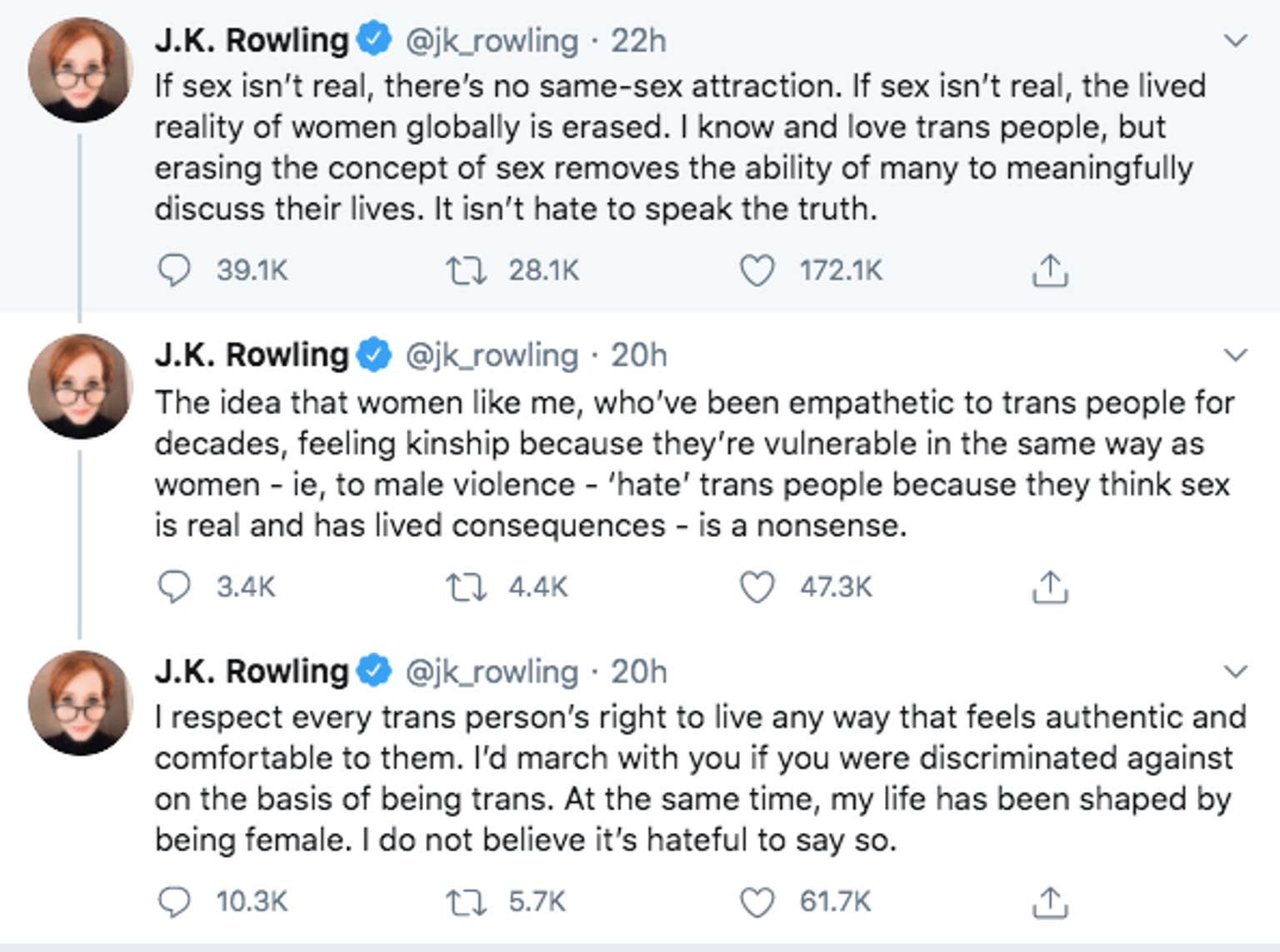
Photo Source
Four days after her initial tweet, Rowling published a formal response on her website along with a tweet entitled “TERF (trans-exclusionary radical feminist) Wars.” In her response, she attempts to explain her actions, asserting that she is interested in the trans community and holds no resentment towards it. She further explains and articulates her support for Maya Forstater, a tax specialist who had lost her job over a series of transphobic tweets. Expectedly, the letter did not resonate well with her fans, thus prompting several public replies.
The Fans Fight Back
Expectedly, the letter did not resonate well with her fans and prompted several public replies, including responses from several cast members of the famed series. Harry Potter himself, formally known as Daniel Radcliffe, took to the media to release a statement on behalf of the Trevor Project. Emma Watson, known for her role as Hermione Granger, also took to Twitter. Like Radcliffe, Watson expressed support for the trans community, explaining that “Trans people are who they say they are and deserve to live their lives without being constantly questioned or told they aren’t who they say they are.” Other cast members like Rupert Grint (Ron Wesley) and Bonnie Wright (Ginny Wesley) expressed their support for the trans community as well. In a statement of his own, for instance, Grint told the Sunday Times that “Trans women are women. Trans men are men.” Meanwhile, Wright took to Twitter to acknowledge trans visibility.

Photo Source

Photo Source
My Opinions
Grint said it best—Trans women are women. As a longtime supporter of the LGBTQ community, it always upsets me to see bigotry and discrimination in the media, but it hurts even more when it comes from the author of your favorite series. Harry Potter is a story of friendship, adventure, and belonging. It is a story of overcoming adversity and defeating evil. It is a series I have such admiration for and one that many have found comfort in for years. However, since this scandal broke in 2020, it has been difficult for many to separate the art from the artist. Many fans have been disassociating from the franchise they once loved, equating the series to its transphobic creator. Personally, I do not identify with this group of fans. While I do not condone or respect J.K. Rowling’s hurtful and transphobic tweets, I still love Harry Potter and can respect the series and its success. I fell in love with Harry Potter before the scandal, so it is far easier for me to separate the art from its controversial artists. Nonetheless, I understand why fans of the series have shunned it, and I cannot say that I blame them.

Photo Source
With the most recent release of Hogwarts Legacy and the highly anticipated HBO series, I think it is important to readdress this issue. Whether you can separate the Wizarding World from its controversial creator or not, it is imperative that we reflect upon the transphobic comments of Rowling and hold her accountable for her actions.
Goodbye For Now!
Well, that is it! Thank you for reading my blog over the past six weeks! I hope you were all able to learn a little more about the LGBTQ community! As always, I would love to hear your opinions on this issue and, as a bonus, your Hogwarts House (I am a very proud Ravenclaw)! Keep researching, advocating, and talking. So long!
Title IX Lifts the Ban of Transgender Sports
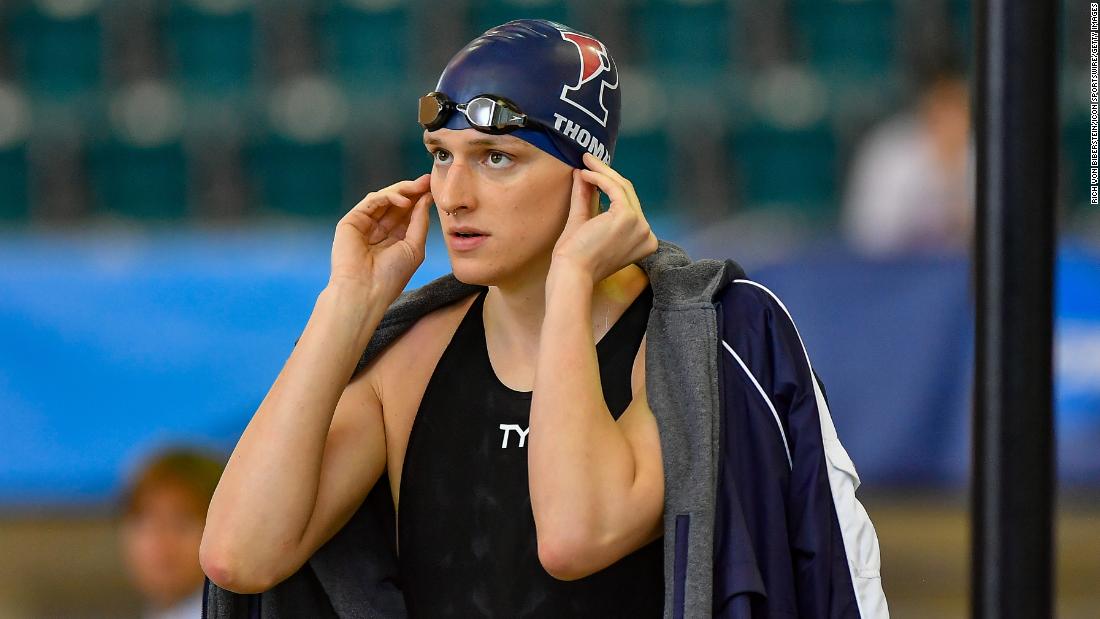
Lia Thomas, the first transgender athlete to win an NCAA D-1 Title | Photo Source
In a previous post, I examined Connecticut’s policy on transgender sports participation in schools, which allowed any transgender female to participate in girls’ high school sports. Back in February, this rule was under review and subject to change in the state of Connecticut. However, with the Biden Administration’s most recent announcement, the ban on transgender participation in sports may be settled once and for all.
The Issue
On April 6, 2023, the United States Department of Education announced a proposed change to Title IX. Signed into law on June 23, 1972, Title IX states that “no person in the United States shall, on the basis of sex, be excluded from participation in, be denied the benefits of, or be subjected to discrimination under any educational program or activity receiving Federal financial assistance.” The Biden Administration’s latest proposal hopes to uphold the promises of Title IX by preventing schools and colleges across the nation from banning nonbinary and transgender students from participating in athletics.
“Every student should be able to have the full experience of attending school in America, including participating in athletics, free from discrimination,” stated United States Secretary of Education Miguel Cardona.
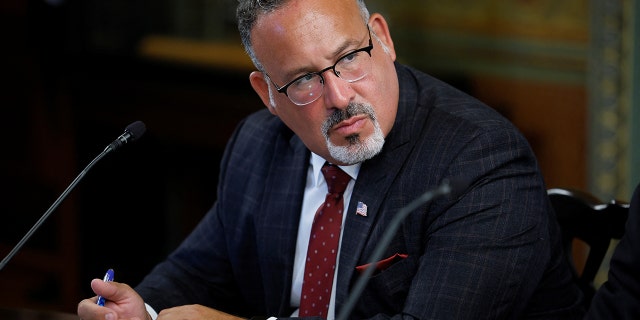
United States Secretary of Education, Miguel Cardona | Photo Source
With this proposed amendment, any policy that bans transgender students from participating on sports teams consistent with their gender identity is in direct violation of Title IX. The policy does recognize that in some instances, specifically in competitive high school and collegiate athletic environments, schools may adopt their own policies that limit transgender students’ participation. However, even with this flexibility, the Federal Government will continue to provide a framework to protect students from discrimination. Before the rule officially goes into effect, there will be 30 days of public comment on the proposition.
The Biden Administration’s proposal comes after the Supreme Court rejected an appeal on Thursday from West Virginia to keep a law in place that bans biological boys from competing on a girls’ sports team. When the West Virginian law was passed in 2021, it was met immediately with a lawsuit from the American Civil Liberties Union (ACLU) and Becky Pepper-Jackson, a transgender middle school student who was prohibited from joining the girl’s cross-country team. The ACLU contended that the law violated Pepper-Jackson’s rights under the 14th Amendment’s Equal Protection Clause and Title IX, thus prompting the Biden Administration to propose a revision to Title IX in the first place.
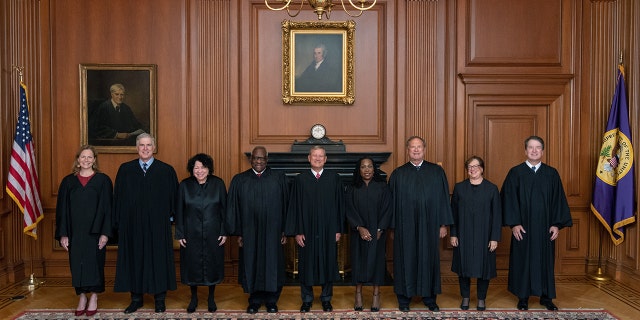
My opinions
The issue of transgender athletes, specifically biological males who identify as females competing against women in women’s sports, has garnered national attention. Currently, 19 states have banned trans athletes from competing in women’s sports, with Kansas being the most recent. As I stated in my previous post about this topic, I am rather split on the issue. While I do think that transgender athletes should be allowed to compete alongside competitors as the gender they identify with, I understand why conservative legislatures think otherwise. After all, cisgender men are biologically stronger and more athletic than the average cisgender female, so there are biological disadvantages if a transgender girl competes against cisgender girls. However, I think that this proposition unifies both viewpoints into one compromise. With this proposition, transgender athletes are still allowed to participate in sports, but competitive athletic programs still have the flexibility to limit participation if they see fit. This way, individual states continue to have power despite the proposition being a piece of Federal legislation. I will be very interested to see if the ruling goes into effect next month.
But what do you think? Do you agree with the Biden Administration’s proposal, or do you think this is an issue best handled on a state-by-state basis? As always, keep researching, advocating, and talking. Until next time!
The Ban on Drag
In a previous post, I reported on the controversy of Drag Story Hour, an organization where Drag Queens read books to young children. Well, Drag Queens are back in the news once more following the ban on public drag performances in Tennessee and the cancellation of a student drag show at West Texas A&M University.
Tennessee’s Ban on Drag

On March 3, 2023, Tennessee signed a bill to restrict public drag performances, thus becoming the first state to pass this kind of legislation. The bill, signed by Governor Bill Lee, makes a “person who engages in an adult cabaret performance on public property” a criminal offense. This, in his definition of “adult cabaret”, includes topless dancers, go-go dancers, exotic dancers, strippers, and male or female impersonators. According to this legislation, a first-time offender will be charged with only a misdemeanor while a second or subsequent violation would be a Class E felony.
As expected, the legislation is receiving heavy backlash from Drag Queens, community members, and left-leaning politicians. According to drag queen Catrina Lovelace, family-friendly drag shows are being misconstrued as sexual. For her, a drag show is simply a “celebration of life.” Furthermore, activists and allies of the LGBTQ community say that right-winging conservatives’ ban on queer spaces and culture forces LGBTQ people back in the closest rather than embracing them. According to Sarah Warbelow, Legal Director of the Human Rights Campaign, “[the right] [is] doubling down on efforts to attack drag artists and transgender youth,” asserting that it is a longstanding and celebratory form of entertainment, and a great source of employment.
Those in support of the bill, such as Senator Jack Johnson, celebrated the bill, claiming that it “gives confidence to parents that they can take their kids to a public or private show and will not be blindsided by a sexualized performance.”
Currently, similar bill shave been introduced in Florida, Arizona, and Texas.
West Texas A&M University Cancels Drag Show

Photo Source
Over in Texas, University President Walter Wendler is gaining traction for canceling a student drag show last week, claiming that such performances degrade women and are “derisive, divisive, and demoralizing misogyny.”
Students and First Amendment lawyers reject these assertions, claiming that Wendler’s comments are a mischaracterization of the art form. Furthermore, they argue that this cancellation violates the student’s constitutional rights. In fact, a state law protecting free speech on college campuses is potentially setting the university up for a lawsuit.
So far, many students have protested this decision, arguing that Drag Shows are simply just an expression of queer joy; it provides queer people with an art form to explore their gender expression in a world of stifling gender norms. Yet, according to Wendler, drag shows “stereotypes women” as a cartoon-like extreme for the amusement of others.
Republican Texas lawmakers have fought back with legislation to regulate a restriction on drag shows, including an imposed fine upwards of $10,000 on business owners who host drag shows in front of children.
My Opinions
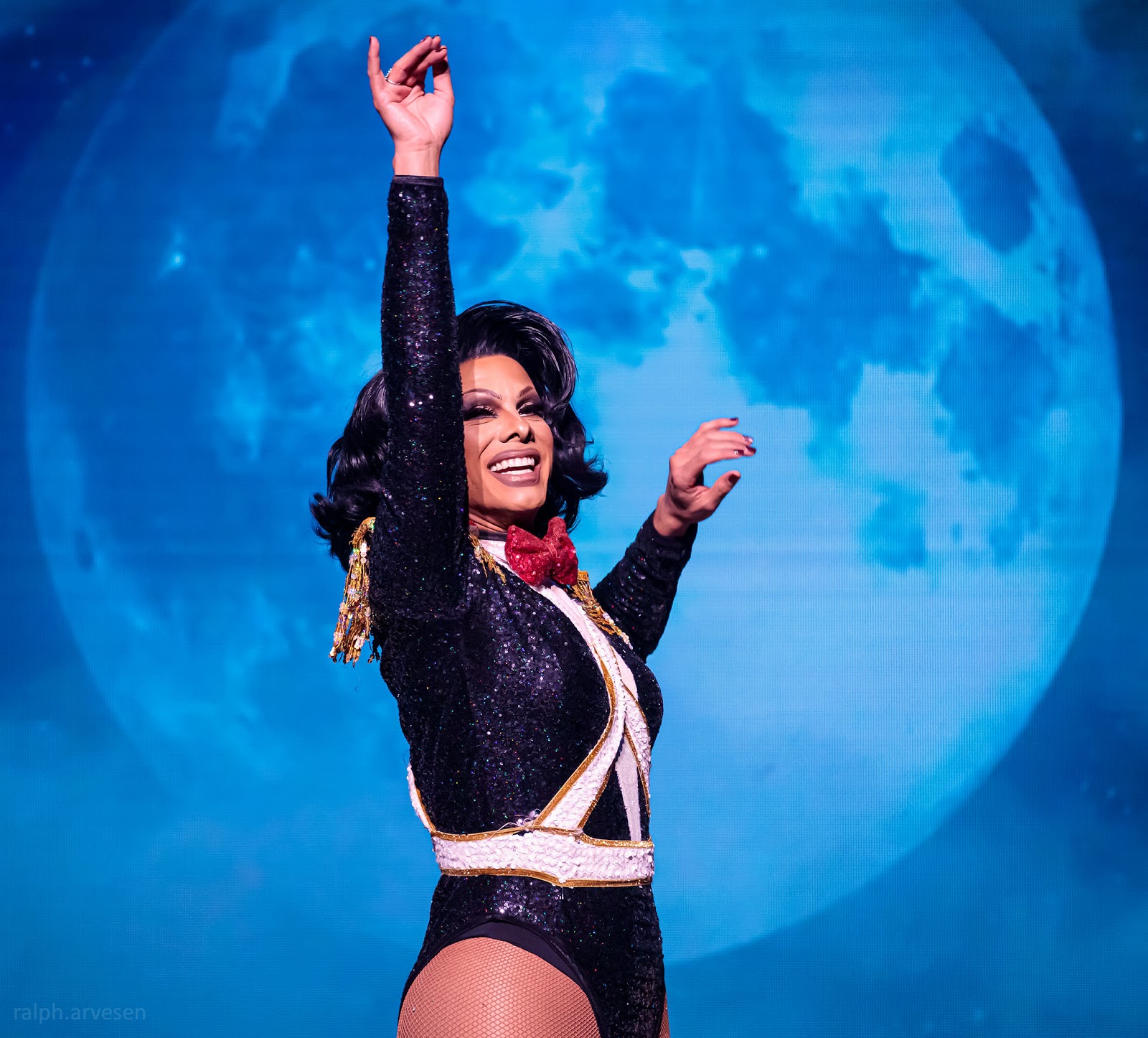
If you have been reading my civic issue blog, it has become apparent that I am a big proponent of drag. Ever since the age of 9, I have loved drag shows and drag art forms. Never once did I feel uncomfortable while watching drag, and never once did I feel like drag was overly sexualized or misogynistic. Of course, I am biased toward the art form, but it makes me sad how hated it is among some politicians. While I can understand other people’s concerns about Drag Shows, I do not necessarily agree with these concerns. From the Drag Show I attended, the subject nature was rather tame. It was not sexualized, and it defiantly did not portray women as cartoonish characters. If a parent does not want to expose their child to drag, I can respect their wishes. However, banning the entirety of drag shows is not fair to the performers and audience members who rely on these shows for employment and/or entertainment.
But of course, that is simply just one opinion. What do you think? Should Drag Shows be banned as a whole, or should they simply have a minimum age requirement? Comment your thoughts below. As always, keep researching, advocating, and talking. Until next time!
The State of Connecticut v. Transgender Athletes
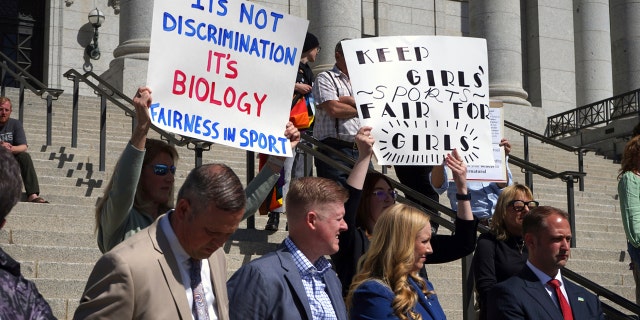
Photo Source
Two months ago, three Connecticut judges ruled that transgender females could participate in girls’ high school sports if they identify as female but now, that ruling is under review.
In February 2020, four high school female runners, Selina Soule, Chelsea Mitchell, Alanna Smith, and Ashley Nicoletti filed a lawsuit against Connecticut’s transgender policy, asserting that transgender athletes have an unfair advantage over cisgender female athletes. The four girls sought injunctions to bar enforcement of Connecticut’s policy on transgender athletes and to remove any record set by a transgender athlete from 2017 to 2020. Additionally, the four girls sought money in damages.
The two transgender sprinters at the center of the lawsuit, Terry Miller and Andraya Yearwood, frequently outperformed their cisgender competitors. They were defended by the American Civil Liberties Union (ACLU) which successfully defended Connecticut’s policy. In December 2022, the three-judge panel ruled that the four girls lacked standing to sue, explaining that their claims about being deprived of wins and scholarship opportunities were speculative.
According to ACLU lawyer Joshua Block, “cisgender girls lose nothing from the participation of transgender girls and Connecticut’s policy simply recognizes the right of all student athletes to equal participation and protection under Title IX.”

Now, only two months after the initial ruling, the 2nd U.S. Circuit Court of Appeals in New York will rehear the appeal of the four cisgender runners, a decision that is rare by the court. On Monday, February 13, the court announced that its decision to rehear the appeal was decided by a majority of its judges, though it did not specify why they wanted to rehear the case. Many suspect that the court’s change of heart is due to its more conservative panel, with five of its 13 judges having been appointed by President Donald Trump.
The plaintiffs will once again be represented by the conservative nonprofit organization, the Alliance Defending Freedom (ADF). According to ADF lawyer Christiana Kiefer, “every woman deserves the respect and dignity that comes with having an equal opportunity to excel and win in athletics.”
Furthermore, ADF lawyer Christiana Holcomb stated, “girls deserve to compete on a level playing field. Forcing them to compete against boys isn’t fair, shatters their dreams, and destroys their athletic opportunities.”
/cdn.vox-cdn.com/uploads/chorus_image/image/71983104/Chelsea_Mitchell_Christian_Abraham_Hearst_Connecticut_Media_.0.0.jpg)
The attorneys of ADF have asked the court to prevent the transgender girls from competing while the lawsuit moves forward, but no hearing date on that request has been scheduled.
Connecticut is currently one of 17 states that allow transgender high school athletes to compete without restrictions. Eight states, on the other hand, have restrictions that make it difficult for transgender athletes to compete while in school, such as requiring athletes to compete under the gender on their birth certificate.
I will be very interested to hear what the court rules in this appeal. Quite frankly, I am rather split on this issue. On the one hand, I think that transgender athletes should be allowed to compete as the gender they identify as. However, I understand the conservatives’ concerns as well. After all, cisgender men are biologically more athletic than the average cisgender female, so a transgender girl would have a biological advantage over their cisgender competitors. But what do you think? Should transgender girls be allowed to compete with cisgender girls, or should they compete with their biological sex? Comment your thoughts below. As always, keep researching, advocating, and talking. Until next time!
Drag Story Hour: Sashay Away
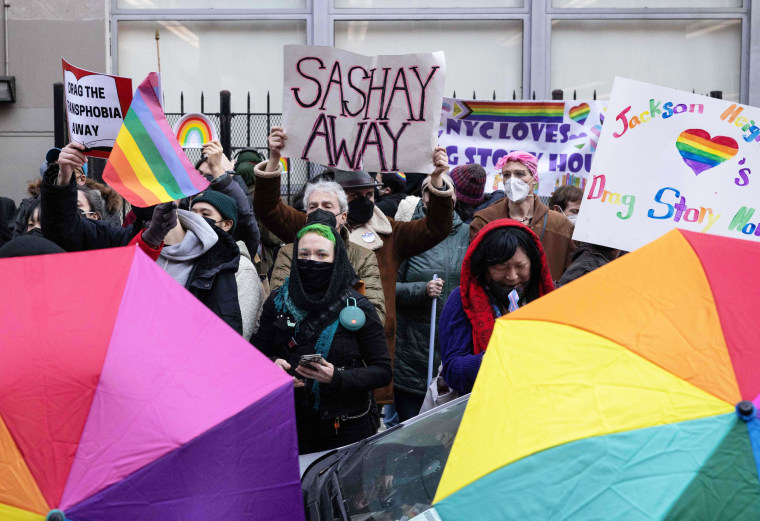
Photo Source
From Shakespearean actors dressing up as women to the popular reality television show RuPaul’s Drag Race, drag has played an integral role in culture and media throughout history. However, some protesters believe that it is time to retire the wigs and dresses for good, all over a Drag Story Hour in Queens, New York. Drag Queens, protests, and story hours—let’s talk about it.
The Drag Story Hour Protests

On December 29, 2022, many New York residents gathered outside of a Queen’s public library to protest the Drag Story Hour taking place inside—a national program where drag performers read books to children in libraries, schools, and bookstores. Since the program’s inauguration in 2015, Drag Story Hour has sought to celebrate diversity and encourage children to read. Unfortunately, as diversity, sexuality, and drag culture continues to polarize the nation, the program has suffered various backlash and controversy.
According to Shekar Krishnan, a New York Council member and representative of the Queen borough, 500 protestors were estimated to be in attendance, with counterprotesters greatly outweighing their anti-drag opponents. Even Krishnan himself stood with the queens and program.
Like the rainbow flag itself, the protest was littered with a colorful array of characters, spanning from the bluest of liberals to the reddest of conservatives. Throughout Queens, signs ranging from “Leave the Kids Alone” to “Drive Homophobia Away” adorned the streets, and that wasn’t even the worst of it. Eventually, the protest became so intense that attendees were carrying Proud Boy Flags while others were giving a Nazi salute.
Yet even before the protest began, Adrienne Adam (New York City Council Speaker) released a joint statement that three members, all of which supported Drag Story Hour, had their homes vandalized. According to councilmember Shekar Krishnan—a victim of the vandalization—stated, “A group of far-right extremists [has] shown up in my neighborhood of Jackson Heights and Elmhurst, four times at my district office, twice at my house, four times at the libraries and at the community events, spewing hate against the LGBTQ community.”
When cops arrived on the scene, they split the camps to either side of the street: one with a loud stream of Drag Story Hour supporters and the other with anti-drag protesters. While a total was not given, the New York Police Department confirmed that arrests had been made, and the event went on as usual.

My Opinions
Since the ripe age of nine, I have always loved, appreciated, and supported Drag culture. Shows like RuPaul’s Drag Race and Dragula are two of my favorite shows, and I even saw a drag show in Salem, so it goes without saying how saddened I was to read about this. Drag performers are always a hoot with their sickening fashion, comedic personalities, and witty banter. I love that Drag Story Hour not only gives Drag Queens a forum to perform and network, but it allows children to learn more about the art form through a safe environment. As I said, drag culture has always been a part of our history, so I find this program to be a brilliant way to embody drag culture. Not to mention, the program encourages reading, a dying pastime thanks to the influx of technology.
While I do not agree with the anti-drag protestors, I can understand where their concern is coming from. Some parents may not want to expose their children to drag at such a young age, especially since some drag queens can be, let’s just say, unfiltered. I know that I was exposed to drag at the age of nine, but some parents may want to ease their child into drag culture when they can understand it better. Furthermore, I do recognize that there is a push for diversity and inclusion which may be off-putting to some. That being said, I still do not think there is anything wrong with a drag queen reading to children at a library. After all, this is a voluntary program, so families do not have to participate if they do not want to. It is understandable if parents do not want their impressionable child to immerse themselves in drag culture (at least not yet), but they shouldn’t protest other families that do.

What Drag Story Hour ultimately comes down to is choice. If a family wants their child to participate, that is their choice. Similarly, if a family doesn’t want their child to participate, that is their choice as well. The drag performer should not be held responsible or targeted just because they want to volunteer and read to children. At the end of the day, this program is driven by a want for diversity and inclusion, and it is not a mandate of any sort. And it just breaks my heart that people are protesting this program when ultimately, they do not have to participate in it if they disagree with the program’s values.
Shantay or Sashay?
So, what do you think? Should Drag Story Hour shantay and stay, or is it time for it to sashay away? Let’s talk about it. As always, keep researching, advocating, and talking. Until next time!
Central Bucks’ New Ban on Pride Flags
/cloudfront-us-east-1.images.arcpublishing.com/pmn/XD62DBLNVJFC3BJO4S2ZDFDRIQ.jpg)
Photo Source
Whether it is June or not, LGBTQ+ pride radiates throughout school districts across the state, but one school district has put an end to pride and LGBTQ+ representation altogether. LGBTQ+ representation—let’s talk about it.
Central Bucks School District, located in Bucks County, Pennsylvania, recently passed a new policy that has sparked controversy and outrage throughout the county, with the loudest protestors being members of the LGBTQ+ community. On January 10, 2023, the Central Bucks School Board passed in a 6-3 vote Policy 321 or, “the Partisan, Political, or Social Policy Advocacy Activities” policy. With this new policy enacted, teachers are now banned to display any flag, banner, poster, sign, sticker, pin, button, insignia, paraphernalia, photos, or anything else similar (exempting the American flag or Pennsylvanian flag). It’s true, the policy is ambiguous, but many teachers have steered clear of the risk of termination by avoiding topics of sexual orientation and gender identity altogether.

While the policy never explicitly mentions LGBTQ+, many members of the community remain threatened and infuriated. According to President Dana Hunter and Vice President Leigh Vlasblom, Policy 321 protects against indoctrination with neutrality. In other words, Hunter and Vlasblom believe that a policy like Policy 321 will foster greater education by minimizing distractions and political symbols, such as the LGBTQ+ flag. As one can imagine, this did not sit well with the LGBTQ+ community. In November, 7 LGBTQ+ students filed a federal Title IX complaint through the American Civil Liberties Union (ACLU), alleging that Central Bucks has created a hostile environment for LGBTQ+ students. Even the nonprofit legal group, Education Law Center, wrote in an October letter that Policy 321 was “overboard, discriminatory and is plainly intended to chill educators’ support for LGBTQ+ students” (Education Law Center).
In response to these suits, Central Bucks hired lawyers Bill McSwain and Michael Rinaldi to represent Central Bucks School District. To the disheartenment of many LGBTQ+ students, Central Bucks won, leaving students with nothing more than a prideless classroom. Eventually, an updated Policy section of Policy 321 was released, explaining that “this policy is not a prohibition on topics of speech. Rather, it is designed to promote education instead of indoctrination or endorsement of partisan, political, or social policy matters.” And while Vlasblom continues to assert that Policy 321 is “not about a policy about pride flags,” parents and students are concerned and outraged. Since the policy has been passed, many protests have ensued. “I’m not surprised, but very disheartened, very upset,” said a Central Bucks woman. “It’s the direction the board has been going and we expected it, but we’re going to keep fighting.”

Unfortunately, Policy 321 is not quarantined to Central Bucks School District. Neighboring districts like Pennridge have also adopted this policy, thus making this a county-wide issue. As a local of Montgomery County (Bucks County neighboring county), I am deeply saddened to hear about the passage of Policy 321. As someone with best friends and a brother in the LGBTQ+ community, I am appalled and disgusted over Central Bucks and their newest policy. Whether the policy was intended to be anti-LGBTQ+ or not, it is still wrong to ban displays of support and pride for such a poorly argued reason. Furthermore, I think it is wrong to closet (no pun intended) teachers and threaten them with termination if they want to display any pride signs, flags, or posters. While I was never a big fan of my school district, I am very grateful that it was a district that was very loving and supportive toward the LGBTQ+ community, and I only hope that Central Bucks can reciprocate that same love and support toward their students.
But what do YOU think? Do you think that this is a protest worth having, or is Policy 321 justified? Let me know your thoughts in the comments below. Until next time! Keep researching, advocating, and most of all, talking!
Hello world!
Welcome to Sites At Penn State. This is your first post. Edit or delete it, then start blogging!
